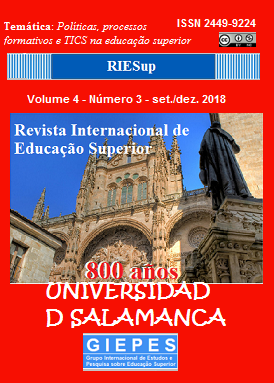Resumo
O presente artigo pretende discutir como as mudanças das categorias de espaço e tempo nas sociedades complexas tem influenciado nos processos formativos na educação superior. A sociedade moderna, sobretudo, nas últimas décadas se caracterizou por intensas e rápidas mudanças no campo da tecnologia que originaram e transformaram as instituições sociais, a vida e a subjetividade. As mudanças das categorias do tempo e espaço são uma das marcas das sociedades complexas, as quais favorecem a consolidação de um modelo produtivo e uma organização social que primam pela rapidez, produtividade, eficiência e flexibilidade. Neste contexto, quais as influências e implicações deste processo para a Educação Superior? Esta questão é norteadora da pesquisa que possui como objetivo compreender como as mudanças do espaço e do tempo nas sociedades complexas tem motivado a estruturação de novas propostas de organização do processo educativo superior. Metodologicamente trata-se de uma pesquisa exploratória de cunho teórico-bibliográfico que conversa com os autores Giddens, Sennett, Ricardo Antunes e Martha Nussbaum. Estes pesquisadores discutem a problemática contemporânea no âmbito da caraterização sócio históricos das sociedades complexas a partir de suas instituições (socialização indivíduo/sociedade) e da morfologia do trabalho. Assim, a mudança das categorias espaço e tempo nas sociedades complexas vêm influenciando na organização da educação superior ao introduzir uma lógica produtivista - mercadológica da flexibilização e da redução do tempo formativo. Neste panorama, a universidade é convidada a pensar e definir não somente o seu papel, mas sua missão frente ao discurso homogeneizador do mercado neoliberal.Referências
ANTUNES, Ricardo. Da pragmática da especialização fragmentada à pragmática da liofilização flexibilizada: as formas da educação no modo produtivo de produção capitalista. Germinal: Marxismo e educação em debate, Londrina, v.1, n.1, p.25-33, jun.2009
ANTUNES, Ricardo. O caracol e sua concha: ensaios sobre a nova morfologia do trabalho. São Paulo: Bontempo, 2015.
CENCI, Ângelo Vitório; MARCON. Telmo. Sociedades complexas e desafios educativos: individualização, socialização e democracia. In: MÜHL, Eldon Henrique; DALBOSCO, Cláudio Almir; CENCI, Ângelo Vitório (Org). Questões atuais de educação: sociedade complexa, pensamento pós-metafísico, democracia e formação humana. Ijuí: EdUnijui, 2016.
DARDOT, Pierre; LAVAL, Christian. A nova razão do mundo: ensaios sobre a sociedade neoliberal. São Paulo: Boitempo, 2016.
GIDDENS, Anthony. Modernidade e identidade. Rio de Janeiro: Jorge Zahar, 2002.
HABERMAS, Jurgen. A crise de legitimidade no capitalismo tardio. Rio de Janeiro: Tempo Brasileiro, 2002.
LYOTARD, Jean-François. A condição pós-moderna. 9. ed. Rio de Janeiro: José Olympio, 2006.
NUSSBAUM, Martha Craven. Sem fins lucrativos: por que a democracia precisa das humanidades. São Paulo: Martins Fontes, 2015.
SANTOS. Boaventura de Sousa. Pela mão de Alice: o social e o político na pós-modernidade. 13.ed. São Paulo: Cortez, 2010.
SENNETT, Richard. A corrosão do caráter: consequências pessoais do trabalho no novo capitalismo. 16. ed. Rio de Janeiro: Reocord, 2011.
A Revista Internacional de Educação Superior utiliza a licença do Creative Commons (CC), preservando assim, a integridade dos artigos em ambiente de acesso aberto.


